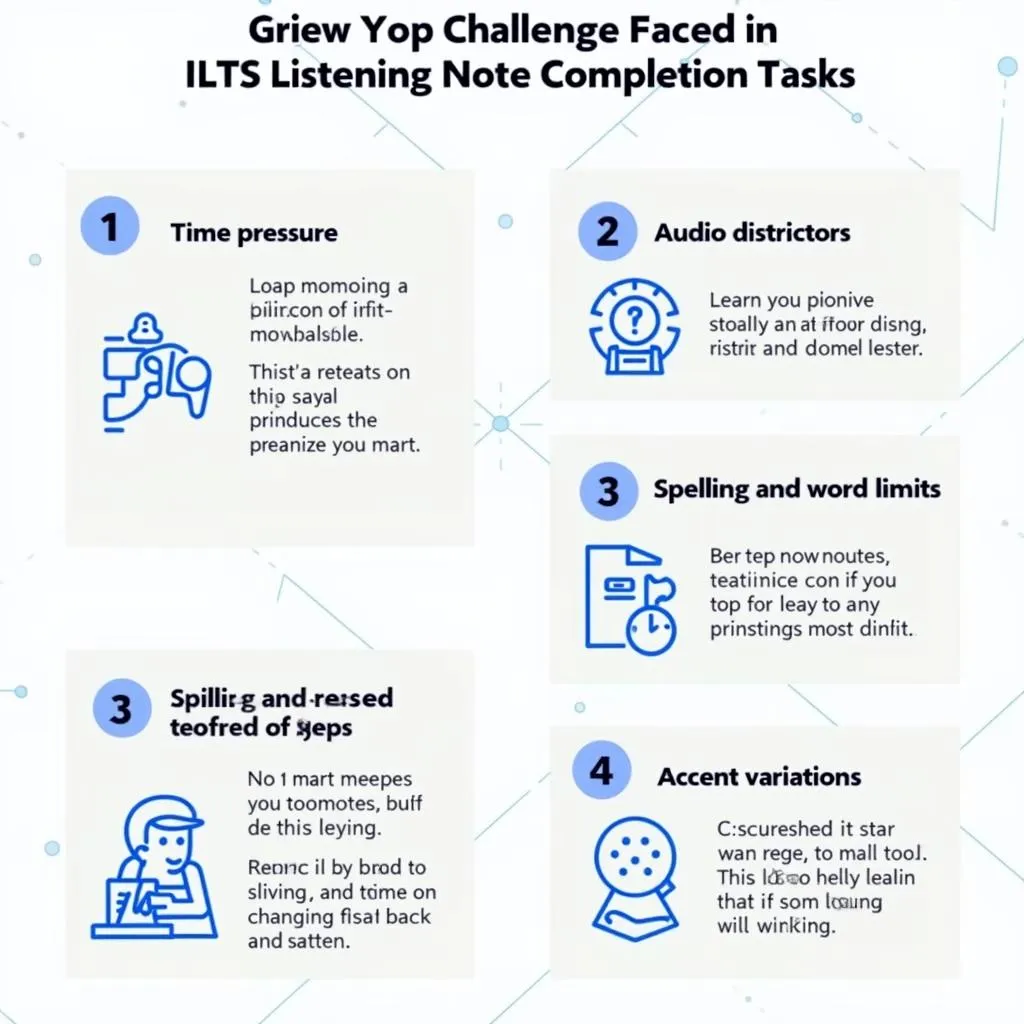Understanding the Importance of Note Completion in IELTS Listening
Note completion is a common and crucial task in the IELTS Listening test. This skill requires candidates to listen carefully and fill in missing information in a set of notes or summary. Mastering note completion can significantly boost your IELTS Listening score, as it tests your ability to identify specific details and understand the main ideas of a conversation or monologue.
Key Challenges in Note Completion
Note completion tasks can be challenging for several reasons:
- Limited time to read and process information
- Distractors in the audio that may lead to incorrect answers
- Spelling and word limit requirements
- Varied accents and speech patterns of speakers
Understanding these challenges is the first step towards developing effective strategies to overcome them.

Essential Tips for IELTS Listening Note Completion
1. Preview the Questions Carefully
Before the audio begins, use the time given to:
- Read through all the questions
- Underline key words in the questions
- Predict the type of information needed (e.g., numbers, names, dates)
- Anticipate synonyms or paraphrases that might be used in the audio
This preparation will help you focus on the relevant information when listening.
2. Listen for Signpost Words
Pay attention to signpost words and phrases that indicate important information is coming:
- “The main point is…”
- “It’s crucial to note…”
- “Let me emphasize…”
- “In conclusion…”
These phrases often signal key details that you need to capture in your notes.
3. Focus on Word Forms and Spelling
Remember that answers must be grammatically correct within the context of the notes. Be mindful of:
- Singular vs. plural nouns
- Verb tenses
- Spelling (especially for names and technical terms)
Practice identifying word forms in context to improve your accuracy.
4. Manage Your Time Effectively
Time management is crucial in the IELTS Listening test. To optimize your performance:
- Don’t spend too long on any single question
- If you miss an answer, move on to the next question
- Use any pauses in the audio to check and review your answers
Developing a sense of timing through regular practice will help you stay on track during the actual test.
5. Practice Active Listening
Develop your active listening skills by:
- Focusing on the overall meaning, not just individual words
- Anticipating what might come next based on context
- Visualizing the scenario being described
Active listening helps you stay engaged with the audio and improves your ability to identify key information.
6. Improve Your Note-Taking Technique
Efficient note-taking is essential for success in note completion tasks:
- Use abbreviations and symbols to save time
- Write legibly to avoid confusion later
- Organize your notes spatially to match the structure of the questions
Develop a personal system of shorthand that works for you and practice it regularly.
7. Familiarize Yourself with Different Accents
The IELTS Listening test features a variety of English accents. To prepare:
- Listen to podcasts, news broadcasts, and interviews from different English-speaking countries
- Pay attention to variations in pronunciation and intonation
- Practice transcribing audio featuring different accents
Exposure to diverse accents will increase your confidence and comprehension during the test.
Common Pitfalls to Avoid
Be aware of these common mistakes in IELTS Listening note completion:
- Writing more than the specified word limit
- Misinterpreting synonyms or paraphrases
- Failing to change word forms as necessary
- Neglecting to check spelling and grammar
- Getting distracted by irrelevant information in the audio
By recognizing these pitfalls, you can develop strategies to avoid them and improve your performance.
Next Steps: Practical Exercises
To reinforce your note completion skills, try these exercises:
-
Transcription practice: Listen to short audio clips and write down every word you hear. This improves your ability to catch specific details.
-
Gap-fill exercises: Create or find texts with missing words and practice filling them in while listening to the corresponding audio.
-
Speed listening: Gradually increase the playback speed of audio materials to improve your ability to process information quickly.
-
Mock tests: Regularly take full-length IELTS Listening practice tests to simulate exam conditions and track your progress.
-
Peer review: Exchange completed note completion exercises with a study partner and provide feedback to each other.
By incorporating these tips and exercises into your IELTS preparation routine, you’ll be well-equipped to tackle note completion tasks with confidence. Remember, consistent practice and a strategic approach are key to mastering this essential IELTS Listening skill. Keep refining your techniques, and you’ll see improvement in your performance over time.